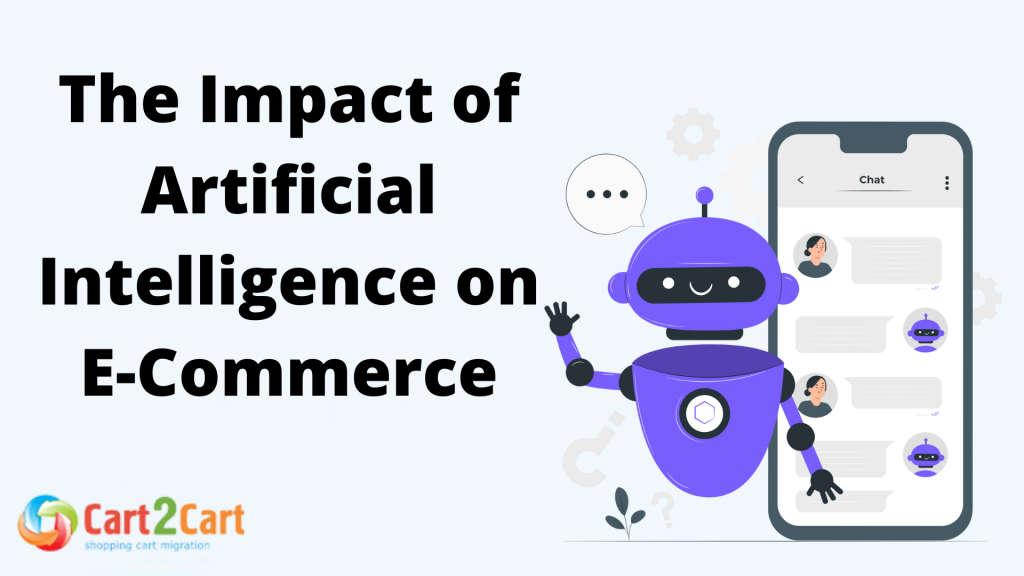
Artificial Intelligence (AI) refers to the simulation of human intelligence in machines that are programmed to think, learn, and problem solve in a similar way to humans. It involves the development of algorithms and software that enable machines to process and interpret data, recognize patterns, and make decisions based on the information available. AI can be applied to various fields such as healthcare, finance, transportation, and manufacturing, where it has the potential to improve efficiency, accuracy, and automation of tasks. From virtual assistants like Siri and Alexa to self-driving cars and advanced robotics, AI continues to have a significant impact on our daily lives and is constantly evolving as technology advances. Understanding the definition of AI is crucial as it becomes increasingly integrated into various aspects of society, shaping the future of how we work and interact with technology.
Overview of E-Commerce Businesses
E-commerce businesses operate in various models, including business-to-consumer (B2C), business-to-business (B2B), and consumer-to-consumer (C2C). B2C e-commerce involves transactions between a company and individuals, while B2B e-commerce focuses on sales between businesses. C2C e-commerce platforms enable individuals to buy, sell, or trade products and services with one another. In the digital market, ecommerce businesses utilize personalized recommendations, targeted marketing, and seamless user experiences to attract and retain customers. These companies also leverage data analytics to understand consumer behavior and preferences. The integration of AI in e-commerce has revolutionized the competitive landscape, enabling businesses to optimize operations, automate customer interactions, and provide personalized shopping experiences. The rapid growth of the e-commerce sector has resulted in increased competition, driving businesses to innovate and differentiate themselves in the market. AI integration has also allowed e-commerce businesses to offer efficient and personalized customer service, impacting the overall customer experience. As a result, e-commerce businesses are constantly evolving to stay ahead in the digital market.
AI and Chatbots
Artificial Intelligence and chatbots have revolutionized the way businesses and individuals interact and communicate in the digital age. AI's ability to learn and adapt to human behavior has made chatbots an invaluable tool for customer service, personal assistance, and even educational purposes. In this article, we will explore the impact of AI and chatbots on various industries, their benefits and limitations, and the future of this rapidly evolving technology. Whether you are a business owner looking to streamline customer support or a consumer curious about the role of AI in your everyday life, this discussion will provide valuable insights into the world of chatbots and artificial intelligence.
Benefits of AI-Powered Chatbots for Customer Services
AI-powered chatbots offer several key benefits for customer services. Firstly, they are capable of providing instant and tailored conversations, ensuring that customers receive personalized assistance and resolutions to their queries in real-time. Additionally, these chatbots can seamlessly guide shoppers 24/7, providing a continuous and enhanced shopping experience. This 24/7 assistance enhances eCommerce customer service, providing support beyond regular business hours and accommodating customers in different time zones. Furthermore, AI-powered chatbots can engage in human-like conversations, making the customer experience more natural and personalized. Moreover, these chatbots can employ a human-in-the-loop approach, where they handle routine tasks but seamlessly transition to human agents when necessary, ensuring a high level of customer satisfaction. They also have the ability to send reminders about abandoned carts, prompting customers to complete their purchases and reducing cart abandonment rates. Overall, AI-powered chatbots are instrumental in providing efficient and personalized customer service, enhancing the shopping experience, and ultimately boosting customer satisfaction and loyalty.

Challenges Faced with AI-Powered Chatbots
AI-powered chatbots in E-commerce have the potential to revolutionize customer engagement and shopping experiences, but they also come with several challenges. One major hurdle is ensuring that the chatbots provide seamless and human-like conversations. Customers expect personalized interactions and quick, accurate responses, so chatbots must be programmed to understand natural language and respond appropriately. Another challenge is addressing abandoned carts. Chatbots can play a crucial role in reengaging customers who have abandoned their shopping carts, but they must be able to effectively persuade customers to complete their purchases without being pushy or invasive. Furthermore, enhancing customer service through chatbots can be challenging. While the goal is to provide 24/7 support and answer customer inquiries promptly, chatbots must also be equipped to handle more complex issues and escalate them to human agents when necessary. Overall, the successful implementation of AI-powered chatbots in E-commerce requires overcoming these hurdles to ensure a seamless and satisfying customer experience. Balancing efficiency with a human touch is key, and businesses must continuously refine and improve their chatbot technology to meet the ever-evolving needs and expectations of their customers.
Examples of Successful AI-Powered Chatbots in E-Commerce
One successful AI-powered chatbot in e-commerce is Sephora's Virtual Artist. This chatbot uses AR technology to enable customers to virtually try on different makeup products, providing a personalized and interactive shopping experience. The chatbot has transformed customer engagement by allowing users to experiment with different looks without the need to visit a physical store, resulting in increased customer satisfaction and higher conversion rates. Another example is eBay's ShopBot, which uses AI to help customers find products through natural language conversations. The chatbot has improved the shopping experience by providing personalized recommendations and guiding users through the shopping process, ultimately leading to higher purchase intent and increased sales. Benefits of using AI-powered chatbots in e-commerce include 24/7 availability, personalized recommendations, instant customer support, and streamlined shopping experiences. These chatbots have also helped businesses reduce customer service costs and increase customer satisfaction. In summary, successful AI-powered chatbots in ecommerce have significantly improved customer engagement and the overall shopping experience, resulting in increased sales and customer loyalty.
Personalized Shopping Experiences Powered by AI
In today's digital age, the retail industry is constantly evolving to meet the demands of tech-savvy consumers. One significant innovation that has transformed the shopping experience is the use of artificial intelligence (AI) to personalize the customer journey. From personalized product recommendations to customized marketing messages, AI has enabled retailers to better understand their customers and provide tailored shopping experiences. This technology has not only enhanced customer satisfaction but also increased sales and customer loyalty. In this article, we will explore the impact of AI on personalized shopping experiences, its benefits for both retailers and consumers, and the future potential of this technology in the retail industry.
Leverage of Purchase History to Offer Personalized Experiences
E-commerce platforms can leverage customers' purchase history to offer personalized experiences by utilizing generative AI and real-time analytics to make tailored product recommendations. By analyzing customers' past purchases, e-commerce platforms can use generative AI to understand their preferences and behavior, which enables them to create personalized product recommendations. This data can also be used to create personalized email campaigns and advertisements, as well as to curate personalized product lists for individual customers. By leveraging this information, e-commerce platforms can create a more personalized shopping experience, ultimately leading to improved customer satisfaction. Personalized suggestions based on purchase history can greatly enhance the overall shopping experience, making it more convenient and enjoyable for customers to find products they are interested in. By offering personalized experiences, e-commerce platforms can foster stronger customer loyalty, increase the likelihood of repeat purchases, and ultimately boost sales. In summary, the use of generative AI and real-time analytics to analyze purchase history allows e-commerce platforms to offer personalized experiences, which can significantly improve the overall shopping experience and increase customer satisfaction.
How AI Helps to Create Targeted Ads and Product Recommendations
AI plays a crucial role in creating targeted ads and personalized product recommendations by leveraging customer data, machine learning algorithms, and chatbots to analyze user behavior and preferences. The use of past purchase history, search history, cart habits, and time spent on product pages allows AI to generate personalized recommendations tailored to each individual user. AI techniques such as collaborative filtering, deep learning, and content-based filtering are utilized to process and analyze this data to create targeted ads and product recommendations. Collaborative filtering involves making automatic predictions about the interests of a user by collecting preferences from many users. Deep learning uses neural networks to understand and process complex patterns in the data, while contentbased filtering takes into account the specific attributes of a product to make recommendations based on similarity. In conclusion, AI's ability to analyze and understand customer data through machine learning algorithms allows for the creation of targeted ads and product recommendations that cater to the unique preferences and behaviors of individual users.
Impact on Conversion Rates and Customer Engagement
The use of AI-driven eCommerce, chatbots, and augmented reality technology significantly impacts conversion rates and customer engagement in online retail. AIdriven eCommerce allows for personalized product recommendations based on customer preferences and behavior, leading to higher conversion rates and increased customer satisfaction. Furthermore, 24/7 customer service availability through chatbots ensures that customers receive immediate assistance, ultimately boosting engagement and loyalty. Augmented reality technology enhances the customer experience by allowing them to visualize products in a virtual space, leading to more informed purchase decisions and reducing the likelihood of returns. This immersive experience also increases customer engagement and satisfaction, ultimately driving brand loyalty. In conclusion, the integration of personalized product recommendations, 24/7 customer service availability, and augmented reality technology in online retail significantly impacts conversion rates and customer engagement. These technologies not only enhance the overall customer experience but also contribute to increased customer satisfaction and brand loyalty in the digital marketplace.

Examples of E-Commerce Brands Using AI for Personalization Strategies
Many e-commerce brands are leveraging AI for personalization strategies to enhance the shopping experience for their customers. Amazon, for example, uses AI algorithms to analyze customer browsing and purchase history to recommend products, personalize search results, and send targeted email campaigns. This level of personalization helps Amazon to increase customer engagement and drive sales. Walmart also utilizes AI for personalization by analyzing customer data to provide personalized product recommendations and offers. This allows Walmart to create a more tailored shopping experience for each customer, leading to increased customer satisfaction and loyalty. Netflix uses AI to personalize movie and TV show recommendations based on individual viewing habits, ratings, and preferences. This personalization strategy has been key to Netflix's success in retaining and attracting subscribers. Similarly, Spotify uses AI to analyze user data and behavior to provide personalized music recommendations and playlists. This personalization strategy has been instrumental in keeping users engaged and satisfied with the platform. Overall, these e-commerce brands are using AI for personalization strategies to create a more individualized and tailored shopping experience for their customers, ultimately leading to increased customer satisfaction and loyalty.
Natural Language Processing (NLP) in E-Commerce
Natural Language Processing (NLP) has revolutionized the way e-commerce platforms interact with customers, providing a more personalized and efficient shopping experience. From product recommendations to customer service chatbots, NLP has become a crucial tool for understanding and responding to the natural language used by consumers. In this article, we will explore the different ways NLP is transforming e-commerce, from enhancing search functionality to improving customer service and sentiment analysis. We will also discuss the potential challenges and limitations of NLP in the e-commerce context, and the future possibilities for this groundbreaking technology in the industry.
What is Natural Language Processing?
Natural Language Processing (NLP) is a branch of artificial intelligence (AI) that focuses on the ability of machines to understand, interpret, and respond to human language. This technology enables machines to read and understand the meaning of documents, emails, PDFs, and other forms of written communication. In the context of ecommerce technology, NLP plays a crucial role in automating tasks such as creating quotes, sorting out relevant information from various documents, and improving customer support through chatbots and virtual assistants. For ecommerce businesses, NLP helps in analyzing customer feedback, understanding customer queries, and providing personalized recommendations based on customer preferences. Additionally, NLP facilitates the extraction of valuable insights from customer reviews and market trends, which can be useful for improving product offerings and marketing strategies. Overall, NLP is extremely relevant for ecommerce technology as it enhances the efficiency and effectiveness of various business processes by enabling machines to interpret and respond to human language in a meaningful way.
How NLP Can Help Gather Valuable Insights from Customer Reviews
NLP, or Natural Language Processing, can be a valuable tool for gathering insights from customer reviews. AI tools equipped with NLP capabilities can effectively analyze and extract important information from a large volume of customer feedback. By utilizing NLP, retailers can identify patterns, sentiments, and trends within customer reviews, allowing them to understand customer preferences and improve their products and services accordingly. NLP can identify patterns within the language used in customer reviews, such as commonly mentioned issues or positive attributes, to help retailers pinpoint areas for improvement. Additionally, sentiment analysis using NLP can reveal the overall tone and feelings expressed in the reviews, providing insight into customer satisfaction and areas of concern. By using NLP to gather insights from customer reviews, retailers can gain a deeper understanding of their customers' experiences and preferences. This allows them to make data-driven decisions to improve their products and services, ultimately leading to more satisfied customers and increased business success.
Inventory Management with Artificial Intelligence
Artificial Intelligence (AI) is revolutionizing inventory management for e-commerce businesses by leveraging historical sales data to predict demand patterns and adjust stock levels accordingly. AI algorithms can analyze vast amounts of data to accurately forecast future demand, reducing the risks of overstocking or understocking. This allows businesses to optimize their inventory levels, minimize holding costs, and ensure timely order fulfillment. Furthermore, AI-powered robots are automating manual processes in warehouses, boosting logistics efficiency, and streamlining operations. These robots can autonomously manage inventory, pick and pack orders, and optimize storage space, reducing the need for human intervention and potential errors. This automation not only saves time and resources but also improves the overall workflow within the warehouse. Overall, with AI, e-commerce businesses can make data-driven decisions, improve inventory accuracy, and enhance customer satisfaction by ensuring products are readily available. This transformative technology is paving the way for more efficient and effective inventory management in the e-commerce industry.
 Artificial Intelligence (AI) refers to the simulation of human intelligence in machines that are programmed to think, learn, and problem solve in a similar way to humans. It involves the development of algorithms and software that enable machines to process and interpret data, recognize patterns, and make decisions based on the information available. AI can be applied to various fields such as healthcare, finance, transportation, and manufacturing, where it has the potential to improve efficiency, accuracy, and automation of tasks. From virtual assistants like Siri and Alexa to self-driving cars and advanced robotics, AI continues to have a significant impact on our daily lives and is constantly evolving as technology advances. Understanding the definition of AI is crucial as it becomes increasingly integrated into various aspects of society, shaping the future of how we work and interact with technology.
Artificial Intelligence (AI) refers to the simulation of human intelligence in machines that are programmed to think, learn, and problem solve in a similar way to humans. It involves the development of algorithms and software that enable machines to process and interpret data, recognize patterns, and make decisions based on the information available. AI can be applied to various fields such as healthcare, finance, transportation, and manufacturing, where it has the potential to improve efficiency, accuracy, and automation of tasks. From virtual assistants like Siri and Alexa to self-driving cars and advanced robotics, AI continues to have a significant impact on our daily lives and is constantly evolving as technology advances. Understanding the definition of AI is crucial as it becomes increasingly integrated into various aspects of society, shaping the future of how we work and interact with technology.




